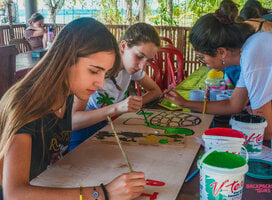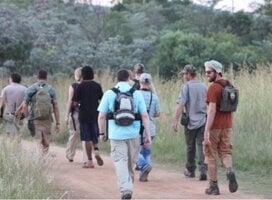Volunteer Work with Elephants Abroad
Elephant tourism is a highly debated topic for the millions of travelers seeking wildlife experiences yearly. While traditionally viewed as a romanticized way of connecting with Asian wildlife, modern-day research has proven that the activity may not be ethically sound after all.
Besides elephant riding and trekking being extremely harmful to an elephant's already damaged spine (from cage-induced stunted growth and abuse), trekking baskets also cause sores that are often left barely treated.
It has been found that in many of these “sanctuaries”, elephants have been taken from their natural habitats, held captive, and emotionally and physically abused in order to “crush the spirit” (a hill tribe practice to “break in” elephants to submission). On the other hand, there are a small number of parks that rescue these elephants from circuses, illegal trade, and harmful environments by purchasing the victim elephants themselves.
Volunteering can be rewarding and crucial to the conservation of endangered elephants. It provides another stream of income for owners; a healthy, safe way to interact with elephants; money to purchase elephants from harmful places (like circuses); and an extra hand for everyday upkeep tasks in the camp.
If you are interested in supporting the movement away from elephant riding and abuse, here are some of the best destinations for volunteer projects with elephants:
Asia
You'll have plenty of destinations in Asia to choose from when it comes to elephant volunteering projects, but some of the most popular destinations include Sri Lanka, India, and Thailand. Thailand is home to some of the most recognized elephant reserves around, but consider looking into Sri Lanka or India for equally excellent options. As a volunteer, you will have the opportunity to volunteer at elephant-safe sanctuaries, learn about ethical elephant tourism, and even take part in contributing to the local village.
Africa
Travel to Kenya, South Africa, Namibia, or Tanzania for some of the largest nature reserves and elephant sanctuaries available. These locations are best for research volunteers, especially those who are interested in a variety of animal species, such as the Big 5. Many sanctuaries are dedicated to providing volunteers with a comprehensive, hands-on learning experience about elephant care and behavior, so be prepared to get your hands dirty at any of these destinations.
Are you unsure of what it is you want to do as an elephant volunteer? Perhaps you are fond of them but want to assist with overall initiatives, as opposed to direct, hands-on care. Or, maybe you're interested in the research side of things.
Luckily, although not in abundance, there are a number of different ways you can volunteer with elephants. Here are three program roles that you might want to consider for your upcoming volunteer travel.
On-site elephant volunteers
On-site camp volunteers work directly with the elephants the majority of the time. Some camps may have just a handful of elephants, while others might have hundreds.
This will determine how often you'll be interacting with one. As an on-site caretaker, you will likely harvest fruits for the elephants, help with farming and field maintenance, and perform health checks or basic caretaking tasks.
Elephant and community volunteers
Establishments that offer hybrid volunteer programs usually have either just a few elephants or plenty of land for the elephants to roam free, leaving you with lots of time on your hands when you don't have an elephant to care for.
As a result, these programs bring you into the villages to help the community. Usually volunteers will help out by teaching English to the local villagers, contributing to small tasks like maintaining a village garden, or playing with the children.
Elephant research volunteers
Volunteers interested in data, science, medicine, and elephant conservation often fit well in programs that offer research opportunities.
These programs usually involve lots of data collection and analysis and sometimes requires a much more elaborate application process. A detailed resume is also recommended, but not required by all programs.
Things to look for in a program
Some important questions to ask before signing up for a project are:
- How many roads are in the area and how many cars drive through it?
- How much land is provided for the elephants to roam freely?
- How much time are the elephants given to roam free?
- How much training do the volunteers receive before working with the elephants?
- Are meals included?
- How often do volunteers go into town?
- What is the ratio of elephant interaction to other volunteer work (like construction, running errands, etc.)?
- How many volunteers are there at a time?
- How many days/hours per week do volunteers work?
- What are the weekly fees to be paid by the volunteer?
- How long is the program?
- What is the minimum age requirement?
Make sure to check reviews on Go Overseas and other rating websites to hear from other people about their previous experiences. It's helpful to search specifically for travel blogger testimonies since they usually give a full essay on their true thoughts about a place.
Housing
Depending on the type of program and the duration, there will likely be a small batch of housing options available to you. Short-term volunteers usually stay in a hostel-like volunteer quarter, while longer stays might include a fully immersive experience through a homestay. Other programs alternate housing each week, allowing volunteers to stay onsite Monday through Friday, and stay with a host on the weekends.
When deciding on a place to stay, note that each program should adequately map out the housing options, costs, and terms.















